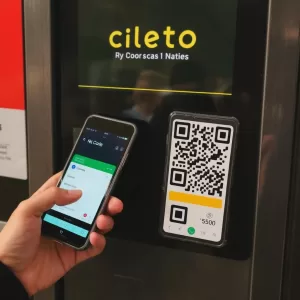Blockchain Technology in Africa: How It’s Revolutionizing Industries
Blockchain technology is transforming Africa by boosting financial inclusion, improving supply chains, and enhancing data security. From mobile money to digital identity verification, blockchain is solving some of Africa’s biggest challenges.
With over 350 blockchain startups operating across the continent, the technology is set to contribute billions of dollars to Africa’s economy by 2030.
Explore how blockchain technology is reshaping Africa. In this article, you’ll learn:
- Challenges and the future of blockchain adoption in Africa
- How blockchain is revolutionizing key industries
- The role of cryptocurrencies and decentralized finance (DeFi)
Blockchain in Finance & Mobile Money
Africa has over 60% of the world’s mobile money users, but traditional banking services still face many limitations. However, blockchain is stepping in to address these challenges and transform the financial landscape. Here’s how:
- Enabling Faster & Cheaper Transactions: By removing intermediaries, blockchain significantly reduces the cost and time involved in cross-border payments. This is especially important for remittances, which are a major source of income for many African families. As a result, people can now send money across borders faster and at lower costs.
- Increasing Financial Inclusion: Traditional banking has long excluded many in Africa, particularly in rural areas. Blockchain opens up access to digital financial services, allowing individuals without bank accounts to participate in the economy. With mobile phones as the gateway, people can now use blockchain to access services like savings, loans, and insurance.
- Enhancing Security & Transparency: Blockchain’s decentralized nature ensures that transactions are secure, transparent, and tamper-proof. This makes it much harder for fraud to occur, providing greater trust in the financial system. With transparent records, users can easily track and verify transactions, further strengthening the integrity of financial systems across the continent.
In summary, blockchain is not just a technological advancement—it’s a catalyst for economic growth and inclusion in Africa.
💡 For example, In Nigeria, the Central Bank launched eNaira, a digital currency powered by blockchain to promote cashless transactions.
Blockchain in Agriculture: Ensuring Food Security
Agriculture is Africa’s biggest industry, yet challenges like fake seeds, unfair pricing, and inefficient supply chains hinder its growth. Fortunately, blockchain is providing innovative solutions to these problems. Here’s how:
- Supply Chain Transparency: Blockchain ensures that farmers can track their produce from farm to market, creating a transparent system that guarantees fair pricing. This transparency helps prevent exploitation by middlemen and ensures that farmers receive a fair share of the profits.
- Smart Contracts for Payments: With blockchain’s smart contracts, farmers can be paid instantly upon delivering their crops. This eliminates the need for intermediaries, reducing the potential for fraud and speeding up the payment process, which is crucial for many farmers operating in remote areas.
- Digital Land Ownership Records: Blockchain helps secure land titles by creating immutable, digital records of ownership. This not only protects farmers from illegal land grabs but also gives them greater access to financing by using their land as collateral.
By addressing these key issues, blockchain is empowering African farmers, promoting fairness, and boosting the growth of the agricultural sector across the continent.
💡 For example, the AgriLedger blockchain project in Kenya helps farmers track produce and get fair payments.
Blockchain in Identity Verification & Governance: A Key Milestone for Blockchain Technology in Africa
Many Africans lack official IDs, which makes it difficult to access essential services like banking, education, and healthcare. Blockchain is addressing this challenge by improving identity systems in the following ways:
- Providing Digital IDs: Governments can use blockchain to issue secure, tamper-proof digital IDs, ensuring that individuals have verifiable identities. This opens the door for more inclusive access to services like banking, healthcare, and education, benefiting those without traditional forms of identification.
- Securing Voting Systems: Blockchain technology can be used to create secure voting systems that prevent election fraud and improve transparency. By ensuring that votes are accurately recorded and verifiable, blockchain strengthens the integrity of democratic processes and builds trust in elections.
- Enhancing Public Services: Blockchain can streamline and secure government transactions, reducing the risk of corruption. With its transparent and immutable ledger, it ensures that public services are delivered efficiently, and resources are allocated properly, enhancing the trust citizens have in their government.
In summary, blockchain is revolutionizing identity systems in Africa, creating more opportunities for access and improving the overall governance structure.
💡 For example, In South Africa, the government is testing blockchain-based digital identity systems.
Cryptocurrencies & Decentralized Finance (DeFi) in Africa
Many Africans are increasingly turning to cryptocurrencies for investment and payments. The adoption of Bitcoin, Ethereum, and stablecoins is growing due to several factors:
- Weak Local Currencies: With inflation affecting many African nations, people are using cryptocurrencies as a hedge against the devaluation of local currencies. Cryptos offer a more stable store of value, protecting individuals’ savings from inflation.
- Access to Global Financial Services: Blockchain technology removes the need for traditional banks, enabling people to access global financial services directly. This is particularly valuable in regions where banking infrastructure is limited, offering a decentralized alternative for payments and savings.
- High Remittance Fees: Sending money across borders has traditionally been expensive, with high fees and long processing times. Cryptocurrencies offer a faster and cheaper alternative, making remittances more affordable and efficient for millions of Africans who rely on international money transfers.
In conclusion, cryptocurrencies are becoming a key tool for financial empowerment in Africa, providing a means to bypass traditional financial systems, secure wealth, and reduce the cost of cross-border transactions.
💡 For example, Paxful and Binance report that Nigeria, Kenya, and South Africa are among the top crypto adopters in the world.
Blockchain in Supply Chain & Trade: Another win for Blockchain Technology in Africa
Africa’s trade system is often hindered by corruption, fraud, and poor logistics. Blockchain is addressing these issues and improving trade efficiency in the following ways:
- Tracking Goods in Real-Time: Companies are using blockchain to monitor shipments from production to delivery. This real-time tracking ensures transparency, helping businesses stay informed about the status of their goods and reducing the risk of theft or delays.
- Reducing Counterfeit Goods: Blockchain’s immutable ledger records the authenticity of products, helping to reduce the influx of counterfeit goods. By verifying the origin and quality of items, businesses can ensure that customers receive genuine products, fostering trust in the market.
- Smart Contracts for Trade Agreements: Blockchain enables businesses to automate the execution of trade agreements through smart contracts. These self-executing contracts ensure that all parties fulfill their obligations, reducing the risk of fraud and disputes in international trade.
By tackling these challenges, blockchain is making Africa’s trade system more efficient, transparent, and secure, paving the way for more seamless and reliable business transactions across the continent.
💡 For example, IBM’s blockchain project in Africa helps businesses track coffee and cocoa exports to ensure fair trade.
Challenges of Blockchain Adoption in Africa
Despite its potential, blockchain adoption in Africa faces several challenges:
- Lack of Regulation: Many African governments have yet to create clear and consistent blockchain policies, which creates uncertainty for businesses and users looking to adopt the technology.
- High Energy Costs: Some blockchain networks require significant electricity consumption, which can be costly and unsustainable, particularly in regions with limited access to affordable energy.
- Limited Public Awareness: A lack of understanding about how blockchain works and its benefits means many people are hesitant to embrace the technology, slowing its widespread adoption.
- Scams & Ponzi Schemes: Fraudulent projects and Ponzi schemes have tarnished blockchain’s reputation in Africa, leading to skepticism and fear among potential users.
Addressing these challenges will be key to unlocking the full potential of blockchain in Africa and ensuring its sustainable growth across the continent.
💡 Solution: Governments and tech companies need to educate the public, regulate crypto, and invest in blockchain-friendly infrastructure.
The Future of Blockchain Technology in Africa
Blockchain technology is poised to play a significant role in shaping Africa’s future, with key trends emerging across various sectors:
- Government-Backed Digital Currencies: More African countries are expected to launch central bank digital currencies (CBDCs), enabling secure, efficient, and inclusive digital payments across the continent. These digital currencies could help streamline financial systems and offer more control over monetary policies.
- Blockchain-powered healthcare records will transform medical services. By securely storing digital patient records on the blockchain, they ensure transparency, privacy, and easy access to health data. This technology will enhance the quality of care, allowing healthcare professionals to make informed decisions based on accurate and up-to-date information. It will also streamline administrative processes, reducing inefficiencies and improving overall operational effectiveness in healthcare systems. As a result, this technology will enhance the quality of care, enabling healthcare professionals to make informed decisions based on accurate and up-to-date information. Additionally, blockchain will streamline administrative processes within healthcare systems, reducing inefficiencies and improving overall operational effectiveness.
- The integration of artificial intelligence (AI) with blockchain will create more efficient, automated business operations. Consequently, the combined power of AI and blockchain will drive innovation and enhance competitiveness across various industries.
- The rise of African blockchain startups is creating new opportunities across the continent. An increasing number of these startups will develop innovative blockchain applications tailored to local needs. As a result, they will drive adoption by creating solutions in sectors like agriculture, finance, and governance. Furthermore, these startups will contribute to economic growth and technological advancement, fostering a more inclusive and efficient digital economy in Africa.
These trends highlight blockchain’s transformative potential in Africa, creating new opportunities for innovation, efficiency, and growth.
💡 For example, Cardano’s blockchain projects in Ethiopia are helping revolutionize education and identity verification.
Conclusion: Blockchain Technology is Africa’s Next Big Revolution
Blockchain is transforming Africa’s finance, agriculture, governance, and trade. In addition, with the right policies, education, and infrastructure in place, the continent can further unlock blockchain’s potential. Moreover, as these elements align, they will create a foundation for sustainable growth, enabling Africa to harness blockchain’s capabilities for long-term development.
Key Takeaways:
- Challenges such as lack of regulation and limited public awareness must be addressed for broader blockchain adoption to succeed.
- Blockchain Technology is driving improvements in financial inclusion, agriculture, and governance across Africa.
- Cryptocurrency adoption is rapidly growing, offering new opportunities for investment and cross-border payments.
Do you have a blockchain idea in mind? Check out these suggested blockchain projects for Africa.
💬 Do you think blockchain will replace traditional banking in Africa? Share your thoughts in the comments!
Share this content:







Post Comment